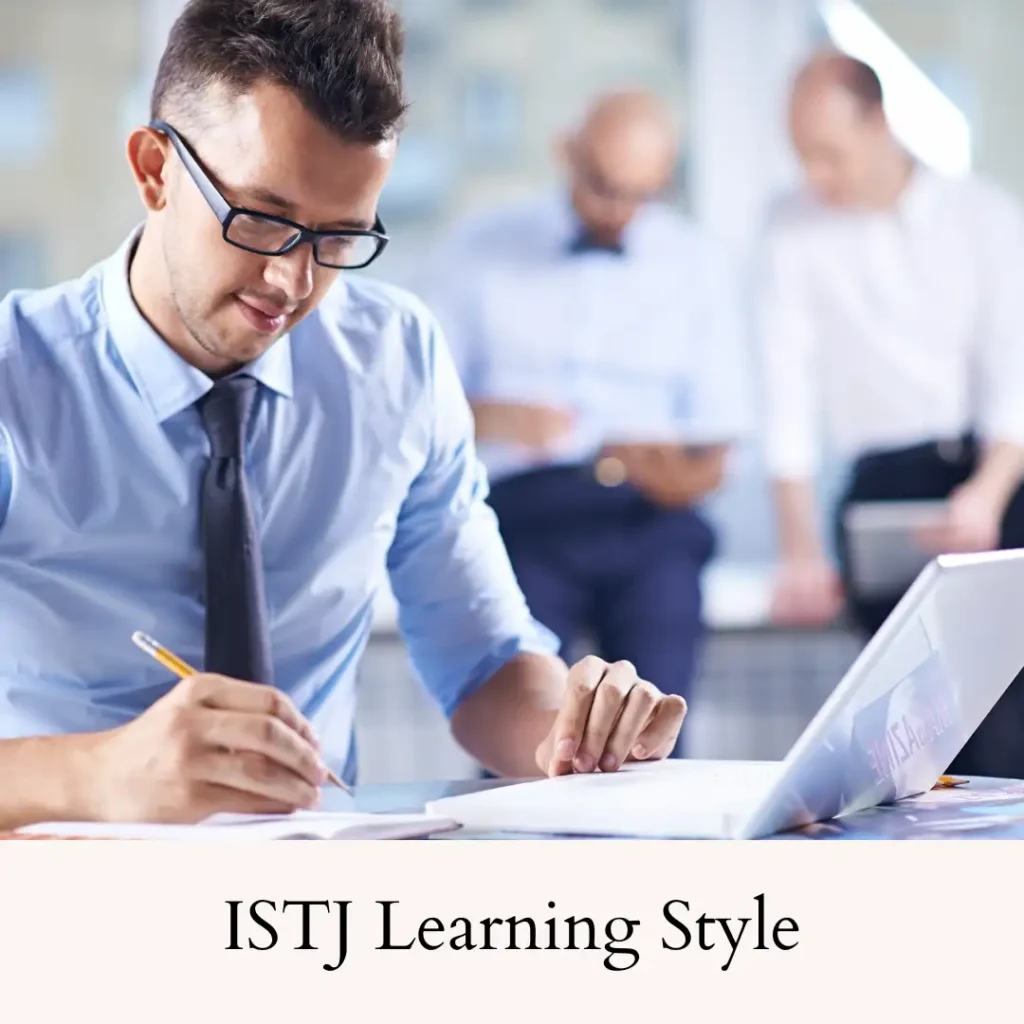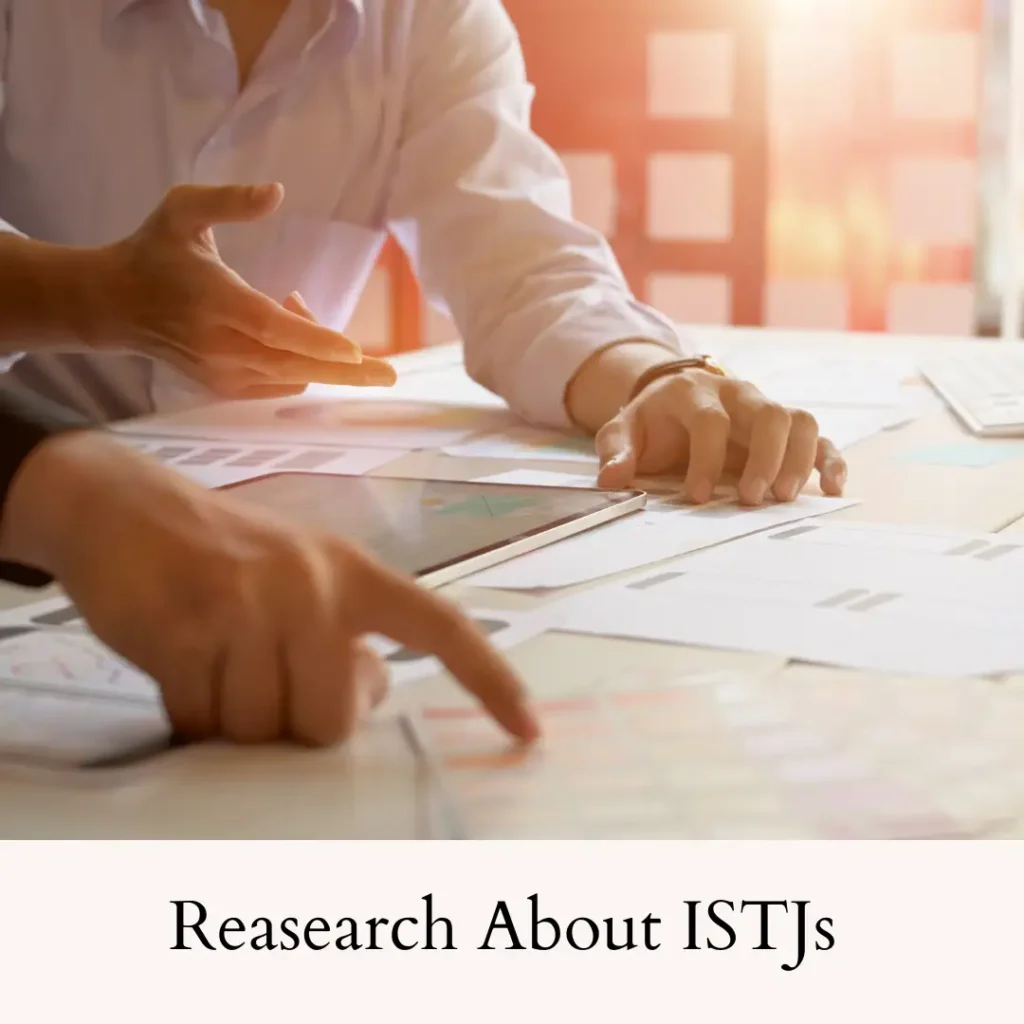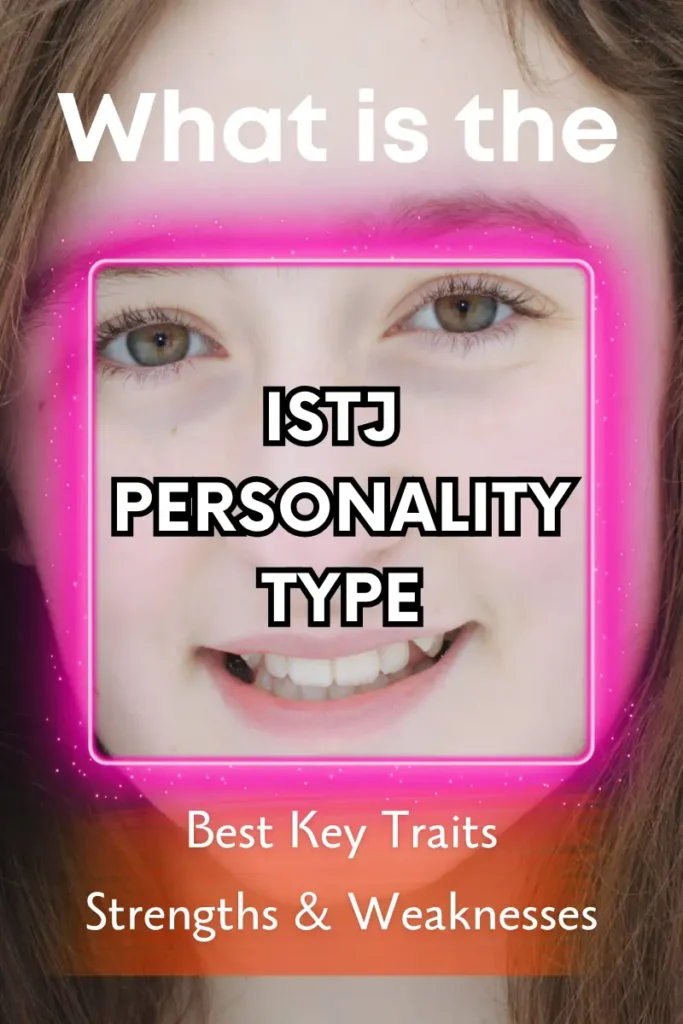The ISTJ personality type, often referred to as “The Inspector” or “The Logistician,” is one of the most reliable and structured of the 16 Myers-Briggs® Type Indicator (MBTI).
Rooted in logic, organization, and a steadfast dedication to duty, ISTJs are the architects of stability in an ever-changing world.
These individuals thrive on order, preferring concrete facts over abstract concepts and valuing consistency and tradition in their personal and professional lives.
With their remarkable focus on practicality and efficiency, ISTJs are often seen as the backbone of society.
Their contributions are felt across industries where reliability and responsibility are vital.
While their outward demeanor might seem reserved or even aloof, ISTJs are deeply committed to their values and relationships.
They work tirelessly to uphold what matters most to them, whether it’s completing a task to perfection or being a pillar of support for their loved ones.
In this blog, we’ll explore the ISTJ personality type in detail, uncovering their strengths, challenges, communication styles, learning preferences, leadership capabilities, and much more.
Whether you are an ISTJ yourself or someone looking to understand and connect with an ISTJ, this comprehensive guide will provide invaluable insights into this methodical and dependable personality.
Table of Contents
Understanding the ISTJ Personality Type
The ISTJ personality type is characterized by a deep sense of responsibility, unwavering focus on details, and a strong commitment to their principles.
These individuals are often drawn to roles that require order, structure, and logical thinking. With a preference for Introversion (I), Sensing (S), Thinking (T), and Judging (J), ISTJs approach life with a measured and methodical mindset.
ISTJs are guided by their need for stability and are naturally inclined toward maintaining systems and traditions that work.
This focus on reliability makes them exceptional problem-solvers in both personal and professional settings.
However, their preference for logic over emotion and their reserved nature can sometimes make ISTJs misunderstood by those who thrive on emotional connection and spontaneity.
At their core, ISTJs are motivated by a desire to create lasting results and leave a meaningful impact.
They are not ones to shy away from hard work, often going above and beyond to ensure that their efforts are thorough and effective.
This dedication to excellence often earns ISTJs the respect and admiration of their peers.
What Does ISTJ Stand For?
The acronym ISTJ represents four distinct cognitive preferences that shape the ISTJ personality type:
- Introverted (I): ISTJs gain energy from solitude and introspection, preferring quiet reflection over bustling social interactions. While they may not seek the spotlight, their inner world is rich with thought and analysis.
- Sensing (S): ISTJs focus on tangible realities, concrete facts, and practical solutions. They rely on their senses to gather information and make decisions based on observable evidence rather than abstract ideas.
- Thinking (T): Logic and objectivity are central to how ISTJs process information and make decisions. They prioritize what makes sense over what feels good, ensuring that their choices are rational and fair.
- Judging (J): ISTJs prefer structure, order, and clear guidelines. They thrive on routines and value predictability, often planning their lives meticulously to achieve their goals efficiently.
Together, these traits form a personality that is highly dependable, pragmatic, and detail-oriented, making ISTJs a cornerstone of any team or organization.
The Inspector: A Brief Overview

Often referred to as “The Inspector,” the ISTJ personality type embodies precision, dependability, and an unwavering commitment to getting things right.
This nickname reflects their natural inclination to scrutinize systems, processes, and situations to ensure that everything operates smoothly and efficiently.
ISTJs have an innate ability to identify flaws and inconsistencies, making them invaluable in roles that require oversight, compliance, and meticulous attention to detail.
The “Inspector” title also highlights the ISTJ’s respect for tradition and their drive to uphold established norms. They are not prone to impulsivity or reckless experimentation, instead opting for methods that are tried and tested.
Their preference for stability and reliability often makes them the go-to person in times of uncertainty or crisis.
While ISTJs may appear stoic or unemotional to those who value expressive communication, their actions often speak louder than words.
They demonstrate care and loyalty through their consistent support, hard work, and dedication to their commitments.
This blend of practicality and reliability is what makes the ISTJ personality type a true asset in any situation, whether in the workplace, at home, or within their community.
Their approach to life is pragmatic and methodical, with a focus on creating lasting results.
Despite their reserved nature, ISTJs deeply value relationships and often go to great lengths to support the people they care about.
Their actions reflect a profound sense of duty and a desire to build a life based on trust, order, and achievement.
Core Traits of the ISTJ Personality Type
The ISTJ personality type is defined by a combination of characteristics that make them reliable, disciplined, and practical.
Their unique traits guide how they approach challenges, build relationships, and contribute to their communities. Here are five core traits of the ISTJ personality type:
1. Reliability

ISTJs are the epitome of dependability. When they commit to something, they follow through with unwavering focus and determination.
This trait makes them trustworthy individuals who can be counted on in both personal and professional contexts.
Their consistent nature ensures that deadlines are met, promises are kept, and expectations are exceeded.
2. Attention to Detail

ISTJs excel in analyzing the finer points of any situation.
Whether they are reviewing a project, planning an event, or managing responsibilities, their focus on details ensures accuracy and quality.
This meticulous approach minimizes errors and contributes to their reputation for precision and thoroughness.
3. Pragmatism

ISTJs prioritize practical solutions over theoretical possibilities.
They value efficiency and prefer to deal with situations based on facts and observable realities.
This grounded perspective allows them to make rational decisions, even under pressure, and ensures that their efforts produce meaningful results.
4. Discipline and Organization

ISTJs thrive in structured environments where order and predictability are prioritized.
They are naturally organized and methodical, often creating detailed plans to accomplish their goals.
This disciplined approach enables them to manage complex tasks with ease and ensures long-term success in their endeavors.
5. Commitment to Tradition

ISTJs respect established norms and traditions, often drawing inspiration from systems and practices that have stood the test of time.
They value stability and continuity, making them strong advocates for preserving family values, cultural heritage, or institutional policies.
This trait provides them with a sense of purpose and direction in life.
These core traits combine to form the foundation of the ISTJ personality type.
They make ISTJs exceptional planners, problem-solvers, and team members, contributing significantly to any group or organization they are part of.
Strengths of the ISTJ Personality Type
The ISTJ personality type is defined by a range of strengths that make them reliable and effective in various aspects of life.
Their practical approach, discipline, and steadfast nature ensure they leave a lasting positive impact wherever they go. Here are their top strengths:
1. Dependability

ISTJs are the personification of reliability. When they commit to something, they follow through without fail, no matter how challenging the task may be.
Their strong sense of duty ensures that they meet deadlines, keep promises, and uphold their responsibilities with unwavering dedication.
Others trust ISTJs because they know they will consistently deliver on their commitments, making them dependable team members and friends.
2. Strong Work Ethic

Hardworking and diligent, ISTJs take pride in the effort they put into their endeavors.
They believe in earning results through persistence and precision, rarely cutting corners or taking shortcuts.
Their work ethic often inspires those around them, as they lead by example, demonstrating what it means to be committed to achieving excellence.
ISTJs approach each task with focus and determination, ensuring high-quality outcomes.
3. Practical Problem-Solving

ISTJs excel at analyzing situations and finding logical, actionable solutions.
Their preference for concrete facts and their sharp focus on the present allow them to tackle problems effectively without getting sidetracked by unrealistic ideas or theories.
ISTJs rely on proven methods and data to address challenges, which makes them resourceful and efficient.
Their problem-solving skills are particularly valuable in crisis situations, where quick and effective decisions are needed.
4. Loyal and Committed

Whether in relationships, friendships, or professional teams, ISTJs are steadfastly loyal.
They value long-term connections and invest time and effort into nurturing trust and stability with those they care about.
5. Organizational Skills

ISTJs are master planners who thrive in structured environments.
They excel at creating schedules, setting goals, and breaking down complex tasks into manageable steps.
Their organizational skills not only help them stay on track but also make them valuable contributors in team settings, where their ability to bring order and clarity can enhance overall productivity.
ISTJs’ love for structure ensures they are prepared for any situation, no matter how unpredictable it may seem.
These strengths highlight the ISTJ personality type’s ability to combine practicality, discipline, and reliability, making them an integral part of any team or community.
Their unique combination of traits allows them to excel in environments that value consistency and logical thinking.
Weaknesses of the ISTJ Personality Type
While ISTJs are known for their reliability and disciplined nature, they also face certain challenges that can impact their interactions and effectiveness.
Understanding these weaknesses can help ISTJs grow and adapt to different situations. Here are some common areas where the ISTJ personality type may struggle:
1. Rigidity in Thinking

ISTJs often have a strong preference for traditional methods and proven systems. While this makes them dependable, it can also lead to inflexibility in thinking.
They may resist new approaches or ideas that deviate from established norms, even when such changes could offer improvements.
This rigidity can limit their ability to innovate or adapt to dynamic environments, particularly in fast-evolving fields or situations that require creative problem-solving.
2. Difficulty Expressing Emotions

ISTJs are practical and focused on logic, which can sometimes make them seem emotionally distant.
They may struggle to express their feelings or connect with others on an emotional level, especially in personal relationships. This tendency can lead to misunderstandings, as loved ones may perceive them as indifferent or unempathetic.
While ISTJs care deeply, they often express their affection through actions rather than words, which may not always be recognized by those around them.
3. Struggle with Abstract Concepts

ISTJs excel at dealing with tangible, concrete details, but they often find abstract or theoretical ideas challenging.
Their preference for practicality means they may dismiss creative or imaginative approaches that don’t seem immediately useful or relevant.
This can hinder their ability to engage in visionary thinking or explore unconventional solutions, especially in environments that value innovation and experimentation.
4. Aversion to Risk

ISTJs prioritize stability and security, which can make them overly cautious when faced with uncertain situations or risks.
While this careful approach helps them avoid unnecessary pitfalls, it can also lead to missed opportunities.
They may hesitate to pursue new ventures or take bold actions, fearing potential failure or disruption to their structured plans.
This reluctance can limit their personal and professional growth in areas that require calculated risks.
5. Tendency to Overwork

ISTJs’ strong sense of duty and work ethic often drive them to prioritize responsibilities over their own well-being.
They may take on more tasks than they can handle, believing that only they can ensure the work is done correctly.
This can lead to burnout and strained relationships, as they may neglect their own needs and fail to delegate effectively.
Finding a balance between their commitments and self-care is essential for long-term success and happiness.
By recognizing these challenges, ISTJs can work on developing flexibility, improving emotional communication, and embracing new ideas.
These adjustments will not only help them address their weaknesses but also enhance their ability to navigate complex situations and build stronger connections with others.
15 Words that Best Describe the ISTJ Personality Type
Reliable
Practical
Loyal
Logical
Disciplined
Organized
Analytical
Reserved
Focused
Meticulous
Consistent
Responsible
Detail-Oriented
Structured
Traditional
Cognitive Functions of the ISTJ Personality Type
The following table displays the whole cognitive function stack for the ISTJ personality type.
SL No. Roles Cognitive Functions 1. Dominant/Hero/Heroine/Leading Introverted Sensing (Si) 2. Auxiliary/Good Parent/Supportive Extraverted Thinking (Te) 3. Tertiary/ Relief/ Eternal Child Introverted Feeling (Fi) 4. Inferior/Aspirational/Anima or Animus Extraverted Intuition (Ne) 5. Opposing/Villian/Backup Extraverted Sensing (Se) 6. Critical Parent/Witch/Senex/Discovery Introverted Thinking (Ti) 7. Trickster/Blind/Deceiving/Comedic Extraverted Feeling (Fe) 8. Demon/Devilish/Angelic/Transformative Introverted Intuition (Ni) ISTJ Personality Type Cognitive Function Stack Key Communication Traits of the ISTJ Personality Type

The ISTJ personality type is known for its straightforward and pragmatic communication style.
ISTJs value clarity and efficiency in their interactions, focusing on delivering and receiving information in a structured and logical manner.
Here are the key traits that define their communication style:
1. Clear and Direct
ISTJs prioritize clarity in their communication, often expressing themselves in a concise and straightforward manner.
They dislike ambiguity and ensure that their points are well-structured, leaving little room for misunderstanding.
This trait makes them effective in professional and task-oriented conversations.
2. Fact-Oriented
ISTJs rely on tangible facts and evidence when communicating.
They prefer to discuss practical details rather than abstract ideas or emotions, which makes their conversations highly informative but sometimes less emotionally engaging.
This factual approach helps them address problems with precision and logic.
3. Formal and Professional
In both personal and professional settings, ISTJs often maintain a formal and respectful tone.
They value politeness and professionalism, especially in workplace communication.
This demeanor reflects their respect for structure and order, ensuring their interactions remain productive and courteous.
4. Reserved in Emotional Expression
While ISTJs are dependable and caring, they tend to keep their emotions private and may struggle to express feelings openly.
In conversations, they are more likely to focus on solutions and actions rather than discussing emotions, which can sometimes make them seem distant or unapproachable.
5. Listening for Specifics
ISTJs are attentive listeners who focus on gathering specific information during conversations.
They prefer to hear clear details and actionable points, as this aligns with their practical mindset.
However, they may become disengaged if discussions become overly theoretical or lack focus.
6. Preference for Structured Discussions
ISTJs thrive in structured conversations with clear objectives and goals.
They appreciate when discussions follow a logical sequence and stay on track, avoiding unnecessary tangents or deviations.
This trait makes them excellent in meetings, planning sessions, and problem-solving discussions.
7. Solution-Focused
ISTJs approach communication with the aim of resolving issues or achieving goals.
They are less interested in venting or philosophical debates and prefer to discuss actionable steps and solutions.
Their pragmatic nature ensures conversations are productive and outcome-driven.
These traits highlight the ISTJ personality type’s preference for practical, efficient, and goal-oriented communication.
While their reserved and factual style may lack emotional warmth, their reliability and focus on clarity make them effective communicators in task-oriented settings.
By learning to balance their logical approach with emotional sensitivity, ISTJs can further enhance their interactions and build deeper connections with others.
Key Learning Traits of the ISTJ Personality Type

The ISTJ personality type excels in structured and disciplined learning environments.
Their preference for practicality, logical reasoning, and detail-oriented approaches shapes their learning style, making them effective in mastering skills and knowledge that have clear applications.
Here are the key traits that define the ISTJ’s approach to learning:
1. Preference for Structure and Organization
ISTJs thrive in learning environments that provide clear objectives, well-defined instructions, and a logical sequence of information.
They are more comfortable when there is a structured syllabus or agenda, allowing them to follow a step-by-step process to understand and retain knowledge.
2. Detail-Oriented Focus
ISTJs have an eye for detail and are adept at absorbing specific pieces of information.
They prefer precise and factual material over vague or theoretical concepts.
This makes them highly effective in subjects that require meticulous analysis, such as mathematics, science, and technical skills.
3. Practical Application of Knowledge
ISTJs are motivated by learning that has real-world relevance.
They are less interested in abstract theories unless they can see how they apply to practical situations.
This focus on utility enables them to excel in vocational training, technical fields, and hands-on activities.
4. Dedication to Mastery
ISTJs approach learning with persistence and a strong sense of responsibility.
They are committed to thoroughly understanding a subject and mastering its intricacies.
This trait makes them reliable learners who can handle complex material with discipline and determination.
5. Preference for Independent Study
While ISTJs can work well in group settings, they often prefer learning independently.
They value the ability to focus on tasks at their own pace without distractions or deviations.
This self-reliance allows them to delve deeply into their studies and achieve a comprehensive understanding.
6. Reliance on Tried-and-True Methods
ISTJs tend to rely on proven methods and established frameworks when learning.
They trust traditional approaches and may resist experimenting with unconventional techniques unless the new method has demonstrated success.
This cautious approach ensures reliability but may limit creativity.
7. Effective Retention Through Repetition
ISTJs benefit greatly from repetition and consistent practice when acquiring new skills or knowledge.
They appreciate review sessions and opportunities to reinforce what they’ve learned, ensuring that the information is firmly embedded in their memory.
8. Challenges with Abstract Theories
ISTJs may find it challenging to engage with subjects that are overly abstract or lack immediate practical application.
They prefer concrete material that has a clear purpose and utility, which aligns with their logical and results-driven mindset.
These traits highlight the ISTJ personality type’s disciplined, practical, and detail-oriented approach to learning.
By focusing on structured environments and real-world applications, ISTJs are able to absorb and apply knowledge effectively.
Understanding these traits can help ISTJs optimize their learning strategies and succeed in both academic and professional endeavors.
Key Leadership Traits of the ISTJ Personality Type

The ISTJ personality type, often called “The Inspector,” is a natural leader in environments that value order, dependability, and structured decision-making.
Their leadership style is defined by a focus on responsibility, precision, and results.
Here are the key traits that make ISTJs effective leaders:
1. Commitment to Duty and Responsibility
ISTJs lead by example, demonstrating an unwavering sense of responsibility and dedication to their roles.
They take their commitments seriously, ensuring that tasks are completed on time and to a high standard.
This trait inspires trust and confidence among team members.
2. Preference for Clear Structure
ISTJs thrive in leadership roles where they can establish clear rules, processes, and expectations.
They excel at creating systems that promote efficiency and consistency, ensuring that everyone understands their responsibilities.
This ability to organize and streamline operations makes them highly effective in management positions.
3. Practical and Results-Oriented
ISTJ leaders prioritize tangible results and practical solutions.
They focus on what works and avoid getting bogged down in theoretical discussions.
Their ability to make logical, evidence-based decisions helps them navigate challenges and achieve measurable outcomes.
4. Strong Ethical Standards
ISTJs value honesty, fairness, and integrity, which are reflected in their leadership style.
They hold themselves and others accountable to high moral standards, ensuring that decisions are ethical and aligned with organizational goals.
This approach fosters a culture of trust and respect.
5. Detail-Focused Decision-Making
ISTJs excel at analyzing details and ensuring that every aspect of a project or task is thoroughly considered.
They rely on facts and data to inform their decisions, which minimizes errors and increases the likelihood of success.
Their meticulous nature helps them anticipate potential challenges and plan accordingly.
6. Reliable and Dependable
ISTJs are consistent and dependable leaders who can be counted on to deliver results.
They provide stability and reassurance to their teams, ensuring that everyone remains focused and motivated.
Their reliability makes them a cornerstone in any organization.
7. Challenges with Flexibility
While ISTJs are strong leaders, their preference for established systems can make them resistant to change.
They may struggle to adapt to rapidly evolving situations or unconventional ideas.
However, when they recognize the need for flexibility, they can effectively incorporate change into their structured approach.
8. Supportive of Team Development
ISTJ leaders are invested in the growth and success of their teams.
They provide clear guidance, constructive feedback, and opportunities for skill development.
Their supportive nature ensures that team members feel valued and empowered to perform at their best.
These leadership traits highlight the ISTJ personality type’s ability to provide stability, structure, and ethical direction.
While their focus on tradition and logic may pose challenges in highly innovative environments, their dependability and results-driven mindset make them invaluable in roles that require discipline and precision.
By balancing their strengths with adaptability and openness, ISTJs can excel as leaders in a variety of fields.
Key Friendship Traits of the ISTJ Personality Type

The ISTJ personality type is known for their loyalty, dependability, and preference for meaningful connections in friendships.
They value long-term, stable relationships and thrive in friendships built on trust and mutual respect.
Here are the key traits that define ISTJs as friends:
1. Loyal and Reliable
ISTJs are steadfast friends who prioritize loyalty above all else.
Once they form a bond, they are deeply committed to maintaining it.
Their friends can count on them to be there in times of need, offering practical support and a dependable presence.
2. Honest and Straightforward
ISTJs value honesty and prefer direct communication in their friendships.
They are unlikely to sugarcoat their thoughts and will provide truthful feedback when asked.
This straightforward approach makes them reliable confidants, though their bluntness may sometimes come across as overly critical.
3. Appreciative of Shared Traditions
ISTJs enjoy building traditions and routines with their friends.
Whether it’s a regular coffee meet-up or celebrating holidays together, they find comfort and joy in shared, predictable activities.
These routines help strengthen their friendships over time.
4. Supportive in Practical Ways
ISTJs show their care through actions rather than words.
They are likely to help their friends solve problems, offer advice, or lend a hand when needed.
Their pragmatic approach to friendship ensures they are seen as valuable and supportive allies.
5. Reserved but Deeply Caring
ISTJs may not openly express their emotions, but their actions often speak louder than words.
They demonstrate their affection through consistent and thoughtful gestures, ensuring their friends feel valued without the need for grand displays of emotion.
6. Selective in Choosing Friends
ISTJs are cautious about who they let into their inner circle.
They prefer quality over quantity and take their time to build trust in new relationships.
Once someone earns their trust, ISTJs are fiercely loyal and dedicated.
7. Encouragers of Responsibility and Growth
ISTJs value responsibility and hard work, and they often encourage these qualities in their friends.
They provide grounded advice and motivate their friends to stay disciplined and focused on their goals, serving as a stabilizing influence.
8. Challenges with Spontaneity
While ISTJs are excellent at maintaining stability in friendships, they may struggle with highly spontaneous or unpredictable friends.
They prefer planned activities and can feel uncomfortable when thrown into unstructured situations.
These traits highlight the ISTJ personality type’s commitment to fostering meaningful and enduring friendships.
Their practical support, loyalty, and reliability make them invaluable companions, while their reserved nature ensures they form deep and lasting bonds with those they trust.
Key Love & Intimacy Traits of the ISTJ Personality Type

The ISTJ personality type approaches love and intimacy with a sense of duty, loyalty, and steadfast commitment.
While they may not be the most outwardly expressive in their affection, their actions often speak louder than words, making them dependable and devoted partners.
Here are the key love and intimacy traits of ISTJs:
1. Loyal and Committed Partners
ISTJs are deeply loyal in relationships, valuing stability and long-term commitment.
They take their promises seriously and work hard to build a relationship that is grounded in trust and mutual respect.
Their reliability ensures their partners feel secure and valued.
2. Practical Expressions of Love
ISTJs are not typically driven by grand romantic gestures; instead, they show their love through practical actions.
Whether it’s helping with everyday tasks, providing financial stability, or being a consistent presence, their way of expressing affection is rooted in reliability and support.
3. Preference for Routine and Structure in Relationships
ISTJs thrive in relationships that have a sense of order and predictability.
They value routines, shared responsibilities, and a clear understanding of roles within the partnership.
This preference for structure can bring stability, but it may require effort to accommodate spontaneity.
4. Respect for Tradition and Values
ISTJs often hold traditional values about love and relationships, including the importance of family and long-term commitment.
They are likely to take a traditional approach to dating and marriage, focusing on creating a partnership that aligns with their deeply held principles.
5. Emotionally Reserved but Deeply Caring
While ISTJs may not frequently verbalize their emotions, their actions reveal their care and devotion.
They are attentive to their partner’s needs and often demonstrate love through thoughtful gestures, problem-solving, and acts of service.
6. Strong Sense of Responsibility
ISTJs view their role in a relationship as a responsibility they must honor.
They are protective and dependable, ensuring their partner feels cared for and secure.
This sense of duty often translates into consistent effort to maintain the relationship’s health and harmony.
7. Challenges with Expressing Emotions
ISTJs may struggle to openly communicate their feelings or engage in deeply emotional discussions.
While they care deeply, their preference for logic and practicality can sometimes come across as detached.
Partners may need to encourage and appreciate their subtle ways of expressing affection.
8. Desire for Loyalty and Dependability in a Partner
ISTJs value reliability in their partners and expect the same level of loyalty and commitment that they provide.
They are drawn to individuals who share their respect for tradition, stability, and hard work.
These traits underline the ISTJ personality type’s approach to love and intimacy, which emphasizes commitment, practicality, and trust.
While they may not be the most emotionally expressive, their consistent and reliable nature makes them devoted and dependable partners who value the long-term success of their relationships.
Suitable Careers for the ISTJ Personality Type

The ISTJ personality type thrives in roles that emphasize structure, organization, and practicality.
Known for their reliability, strong work ethic, and attention to detail, ISTJs excel in careers where they can apply logical thinking and follow established systems to achieve results.
Here are some career paths that align well with the ISTJ personality type:
1. Accountant or Auditor
ISTJs are naturally skilled at managing details and following strict procedures, making them well-suited for roles in accounting or auditing.
Their ability to focus on accuracy and adhere to financial regulations ensures they excel in maintaining financial records and analyzing budgets.
2. Engineer
Engineering offers ISTJs the opportunity to solve practical problems through logical and methodical approaches.
Fields such as civil, mechanical, or software engineering provide the structured environments and clear objectives that ISTJs prefer.
3. Law Enforcement Officer
ISTJs’ respect for rules, order, and responsibility makes them ideal candidates for careers in law enforcement.
Their sense of duty and attention to detail allow them to enforce regulations effectively and ensure public safety.
4. Project Manager
As natural planners, ISTJs thrive in project management roles where they can create schedules, organize resources, and oversee execution.
Their ability to stay organized and ensure deadlines are met makes them invaluable in coordinating teams and delivering results.
5. Military Officer
ISTJs often resonate with the discipline, structure, and clear hierarchy found in military careers.
Their dedication to duty and respect for protocol enable them to perform exceptionally well in leadership or strategic roles.
6. Healthcare Administrator
Healthcare administration provides ISTJs with an opportunity to use their organizational skills and attention to detail to manage hospital operations, ensure compliance with regulations, and improve patient care systems.
7. Data Analyst
ISTJs’ logical thinking and focus on accuracy make them excellent data analysts.
They excel in analyzing complex datasets, identifying trends, and presenting actionable insights in fields such as finance, marketing, or healthcare.
8. Paralegal or Legal Assistant
ISTJs’ respect for structure and process makes them well-suited for careers in the legal field.
As paralegals or legal assistants, they can meticulously organize case files, conduct research, and ensure compliance with legal standards.
9. Operations Manager
Operations management allows ISTJs to apply their organizational skills to streamline business processes.
They thrive in roles where they can oversee logistics, optimize workflows, and ensure operational efficiency.
10. Archivist or Librarian
ISTJs’ love for order and knowledge makes them a great fit for careers as archivists or librarians.
These roles allow them to organize and manage information systematically, catering to their natural attention to detail.
11. IT Specialist or Systems Administrator
ISTJs’ logical mindset and ability to troubleshoot make them excellent in IT roles.
As systems administrators or IT specialists, they ensure the smooth operation of technology infrastructure within an organization.
12. Compliance Officer
ISTJs excel in roles that require enforcing rules and regulations.
As compliance officers, they ensure that organizations adhere to laws, policies, and industry standards.
13. Teacher or Educator
ISTJs can thrive in teaching roles, particularly in subjects that require structure and precision, such as math, science, or history.
They excel at creating organized lesson plans and instilling discipline in their students.
14. Banker or Financial Planner
ISTJs’ affinity for numbers and their ability to manage details make them well-suited for careers in banking or financial planning.
They are adept at evaluating financial data, managing accounts, and advising clients.
15. Quality Assurance Specialist
In roles focused on quality control, ISTJs’ attention to detail ensures products or services meet high standards.
They excel at identifying errors and implementing improvements.
These career paths align with the ISTJ personality type’s strengths, including their methodical approach, reliability, and preference for structure.
While ISTJs excel in roles that emphasize tradition and order, they can also succeed in dynamic environments that value their ability to bring discipline and logic to the table.
Famous ISTJs and ISTJ Celebrities
1. Pope Benedict XVI

A deeply traditional and meticulous theologian, Pope Benedict XVI exemplified the ISTJ personality type with his dedication to preserving Catholic doctrine and his methodical approach to leading the Church.
2. Jack Nicklaus

Known as the “Golden Bear,” the legendary golfer’s precision, discipline, and consistent focus on improvement perfectly align with the characteristics of the ISTJ personality type.
3. George Washington

As the first U.S. President, Washington’s sense of duty, strong moral compass, and commitment to structure reflect the steadfast and reliable nature of ISTJs.
4. Henry Ford

The pioneering industrialist’s innovative assembly line method and unwavering commitment to efficiency and quality exemplify the pragmatic and logical strengths of the ISTJ personality type.
5. Warren Buffett

Known as the “Oracle of Omaha,” Buffett’s cautious, detail-oriented investing style and adherence to proven methods showcase the methodical and dependable traits of an ISTJ.
6. Harry S. Truman

Harry S. Truman, the 33rd President of the United States, exemplified the ISTJ personality type with his strong sense of duty, logical decision-making, and unwavering dedication to his principles.
Known for his no-nonsense leadership and integrity, Truman demonstrated resilience and pragmatism, most notably in his decisive actions during World War II and the post-war reconstruction era.
7. Amitabh Bachchan

The Bollywood icon’s professionalism, discipline, and consistent dedication to his craft over decades highlight the reliability and work ethic of the ISTJ personality type.
8. George Strait

The “King of Country” music is known for his traditional style, consistency, and steadfast dedication to his craft, traits that align with the ISTJ’s preference for stability and discipline.
9. Sting

The musician’s precision in songwriting and his disciplined approach to creativity reflect an ISTJ’s ability to combine practicality with artistic expression.
10. Angela Merkel

As Germany’s former Chancellor, Merkel’s logical decision-making, adherence to facts, and calm demeanor perfectly embody the practical and reliable nature of the ISTJ personality type.
Tips for the ISTJ Personality Type for Balance & Personal Growth

The ISTJ personality type is naturally disciplined, detail-oriented, and focused on achieving goals through structure and hard work.
While these traits are strengths, they can sometimes lead to stress, rigidity, or neglect of personal relationships and self-care.
Here are practical tips for ISTJs to maintain balance and foster personal growth:
1. Practice Flexibility
ISTJs often prefer routines and predictability, but life can be unpredictable.
Cultivate the ability to adapt when things don’t go as planned.
Embracing change and being open to new experiences can help you grow and reduce stress.
2. Prioritize Emotional Awareness
While ISTJs tend to focus on facts and logic, it’s important to recognize and express emotions, both your own and others’.
Take time to reflect on your feelings and practice empathy to strengthen personal relationships and communication.
3. Set Realistic Expectations
ISTJs often hold themselves and others to high standards, which can lead to frustration.
Learn to set realistic goals and understand that perfection isn’t always necessary.
Celebrate progress and effort, not just results.
4. Develop Creative Outlets
Engaging in creative activities like painting, writing, or music can provide a healthy balance to your structured and logical mindset.
These pursuits encourage relaxation and can spark new ways of thinking.
5. Strengthen Interpersonal Connections
ISTJs sometimes prioritize work over personal relationships.
Make time to connect with family and friends, and actively nurture your relationships.
Practicing active listening and showing vulnerability can enhance bonds with loved ones.
6. Embrace Mindfulness and Relaxation
With a focus on productivity, ISTJs can overlook the importance of relaxation.
Incorporate mindfulness techniques such as meditation or yoga into your routine to reduce stress and maintain mental clarity.
7. Seek Diverse Perspectives
ISTJs tend to rely on their own judgment and experiences, but seeking input from others can broaden your understanding.
Engage in conversations with people who have different viewpoints to challenge and expand your perspective.
8. Invest in Lifelong Learning
ISTJs thrive on knowledge and structure, making them natural learners.
Explore new subjects or hobbies that interest you, whether through formal courses or personal research.
Continuous learning can bring fulfillment and adaptability.
9. Balance Work and Play
ISTJs are known for their strong work ethic, but it’s important to set boundaries and schedule time for leisure and fun.
Pursue activities that bring you joy and allow you to unwind.
10. Focus on Self-Care
Ensure you’re taking care of your physical health by maintaining a balanced diet, exercising regularly, and getting enough sleep.
Prioritizing self-care ensures you have the energy and resilience to meet challenges effectively.
11. Learn to Delegate
ISTJs often prefer to handle tasks themselves, but learning to delegate can reduce stress and improve efficiency.
Trust others to share responsibilities, both at work and home.
12. Practice Gratitude
Take time to appreciate the positive aspects of your life.
Practicing gratitude can help shift your focus from challenges to achievements, fostering a more positive outlook.
13. Embrace Humor and Spontaneity
Allow yourself to enjoy moments of fun and laughter, even if they disrupt your routine.
A little spontaneity can bring lightness and joy to your life.
These tips can help ISTJs maintain balance, strengthen relationships, and grow personally and professionally.
By stepping outside their comfort zone and prioritizing emotional and physical well-being, ISTJs can unlock their full potential while living a more balanced and fulfilling life.
Research Describing the ISTJ Personality Type

The ISTJ personality type, often known for its calm and steady nature, exhibits fascinating trends in various domains like education, career preferences, health, and leadership.
Based on detailed research, here are ten key insights into the ISTJ personality type:
1. High Preference for Structure in Work Environments
ISTJs are known for thriving in workplaces where “everything is done by the book.”
Their emphasis on structure and clarity makes them one of the top types favoring environments with clear guidelines, responsibilities, and predictable routines.
2. Strong Representation in Management and Financial Fields
The ISTJ personality type is overrepresented among bank officers, financial managers, and administrative roles, showcasing their preference for stability, precision, and responsibility in their careers.
3. Superior Deductive Reasoning Skills
ISTJs excel in deductive reasoning, making them naturally effective in roles that demand logical problem-solving and methodical analysis.
This aligns well with their dominant Thinking and Sensing cognitive functions.
4. Top Performers in College Academics
ISTJs are among the top types in college GPAs, demonstrating their ability to stay organized and excel in structured academic environments.
They also shine in subjects like math and practical skills.
5. Preference for Practical and Technical Careers
With a natural inclination toward industrial and technical fields, ISTJs are among the top types in industrial/technical teaching roles, further emphasizing their hands-on, practical approach to work.
6. Overrepresented in Health Challenges Related to Stress
ISTJs are more likely to experience stress-related health conditions, such as heart disease and hypertension.
They are also overrepresented in cardiac rehabilitation programs, likely due to their high standards and tendencies to internalize stress.
7. Low Creativity but High Stability
While ISTJs rank low on measures of creativity, they are recognized for their exceptional soundness and steadiness, qualities that contribute to their success in structured and conventional environments.
8. Prominent Small Business Owners
ISTJs are overrepresented among male and female small business owners, highlighting their entrepreneurial ability to create stable and sustainable enterprises.
9. Dissatisfaction with Promotions
Despite their dedication and hard work, ISTJs often feel dissatisfaction with promotions.
This could stem from their focus on organizational values like fairness and transparency rather than self-promotion.
10. Guarded but Reliable Leaders
In leadership roles, ISTJs are described as “Guarded” and “Pressuring.”
They emphasize following established rules and trust systems but may face challenges in dynamic team environments requiring active collaboration.
These research findings offer valuable insights into the ISTJ personality type, showcasing their strengths, tendencies, and areas for growth.
Whether in academics, careers, or health, ISTJs stand out for their commitment to structure, reliability, and logical problem-solving.
Conclusion for the ISTJ Personality Type

The ISTJ personality type, often referred to as “The Inspector,” embodies reliability, practicality, and a strong sense of duty.
Known for their meticulous attention to detail and unwavering commitment to responsibilities, ISTJs excel in structured environments where their organizational skills and logical thinking shine.
They are pillars of dependability, ensuring that systems run smoothly and tasks are completed with precision.
While ISTJs are driven by a deep respect for tradition and a preference for clear rules, they can benefit from embracing flexibility and emotional awareness to balance their methodical nature.
Nurturing interpersonal relationships, practicing self-care, and exploring creative outlets can help ISTJs find harmony between their work-focused mindset and personal fulfillment.
In a world that often thrives on chaos and spontaneity, the ISTJ personality type provides a much-needed sense of stability and order.
Whether in leadership roles, friendships, or family dynamics, ISTJs leave a lasting impression as reliable and trustworthy individuals who can be counted on to uphold their commitments and deliver results.
By understanding their strengths and addressing areas for growth, ISTJs can lead enriched, balanced lives while continuing to make meaningful contributions to their relationships, careers, and communities.
The ISTJ personality type truly exemplifies the power of diligence, integrity, and practicality in navigating life’s complexities.
If you enjoyed this post, don’t forget to check these!
ESFJ Personality Type: Best Key Traits, 8 Strengths, and Weaknesses
ISFJ Personality Type: Best Key Traits,5 Strengths and Weaknesses
ENFJ Personality Type: Best Key Traits, 8 Strengths and Weaknesses
If you found this information helpful, share it with someone who needs it. Also, let me know your thoughts below in the comment section.
